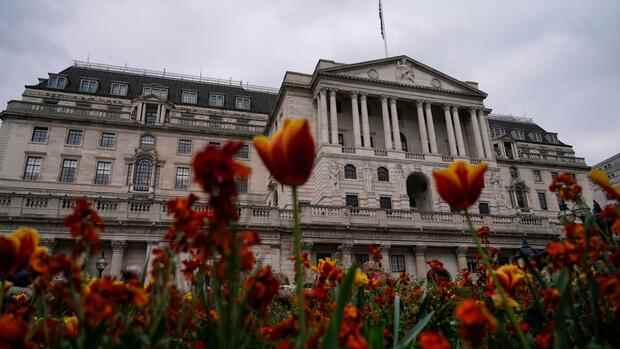The bank is raising interest rates again.
(Photo: AP)
London The Bank of England (BoE) has raised the key interest rate in Great Britain to 1.0 percent for the fourth time in a row, despite the growing risk of recession. This increases the pressure on the European Central Bank (ECB) to follow the example of other large central banks and also increase their interest rates.
The US Federal Reserve (Fed) raised US interest rates by 50 basis points on Wednesday. The BoE left it at a rate hike of 25 basis points. The policy rate is an important factor influencing lending and consequently an economy’s inflation and growth prospects.
The British central bank is thus reacting to the inflation rate on the island, which has risen sharply in recent months, which had reached its highest level in 30 years at seven percent in March. The BoE economists fear that the inflation rate could even climb to over 10 percent later in the year before the price pressure then eases again in the coming year. The central bank’s inflation target is two percent.
Six of the nine members of the Monetary Policy Council voted in favor of the rate hike. Three even called for an interest rate hike of half a percentage point in view of the threat of a wage-price spiral. At the same time, the BoE lowered its growth forecast and now expects a slight recession in Great Britain in the coming year. The gross domestic product is expected to shrink by 0.25 percent.
Top jobs of the day
Find the best jobs now and
be notified by email.
This is bad news for the Brits, who are suffering from sharply rising energy costs – the country is now threatened with stagflation with falling real incomes. The central bankers said they were powerless to counteract this. Federal Reserve Chairman Andrew Bailey has described the loss of income as a “historic shock”.
No active reduction of total assets
Local elections are taking place in Great Britain on Thursday, in which the governing Conservatives of Prime Minister Boris Johnson have to reckon with a high loss of votes. The rising cost of living was the main campaign issue.
The BoE also decided not to follow the US Federal Reserve’s lead and start actively selling its £875 billion in assets. The central bank had built this up since 2009 as part of its quantitative easing programme.
More: Johnson is fighting for his political survival – a historic election outcome is looming in Northern Ireland
